This post contains affiliate links. We may get paid an affiliate commission if you buy something or take an action after clicking one of the links on this web page.
One thing I have always had is a healthy respect for is a good fixed blade knife. As a young infantryman I fell victim to some clever marketing from Gerber and purchased the Gerber LMF II Infantry. It had infantry in the name so I couldn’t go wrong right? While I may have been a victim of marketing, I didn’t feel victimized. The LMF II served me well, but everything can be improved. The Gerber StrongArm is in many ways the successor to the Infantry, and is better suited to the infantry role.
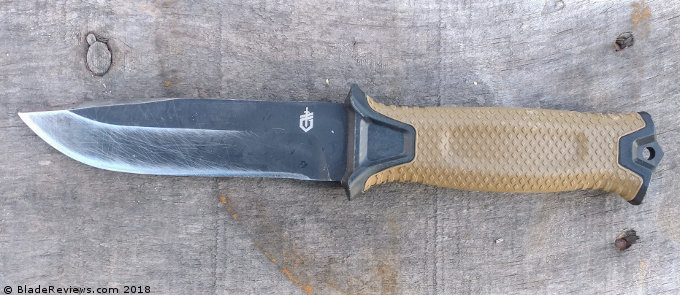
Buy the Gerber StrongArm at BladeHQ
The LMF II Infantry has a fascinating story and was built for a very specific purpose you should check out here. That specific purpose resulted in the knife’s lack of a full tang. The Gerber StrongArm resolves this issue. The StrongArm is a little lighter, a little shorter, and is more refined than the Infantry LMF II. The StrongArm is a versatile capable, and affordable knife made in Portland, Oregon.
General Dimensions and Blade Details
The Gerber StrongArm has 4.8 inch fixed blade made from 420 HC steel, is 9.8 inches overall, weighs 7.2 ounces and is proudly made in the United States. This is a classic fixed blade knife that isn’t trying to revolutionize the standard military style survival knife. In terms of fixed blades it’s actually somewhat small. It’s a half inch shorter than the LMF II Infantry, but has an almost identical blade length.
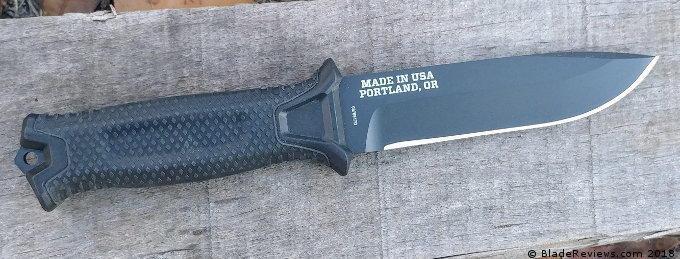
The knife is easy to carry, and perfect for those looking to trim as much weight as possible from their loadouts. That’s generally the goal of dismounted infantry. Ounces equal pounds, and pounds equal pain.
The StrongArm comes with options for both a serrated or plain edge. I prefer the plain edge. The blade is coated with a cerakote black matte finish. The finish is tough, but will wear with time and effort like any finish would. The 420 HC steel does mean that once the finish is worn away rust may develop. Keep the knife cleaned, and oiled as the finish migrates and you won’t have any issues.
The older FDE StrongArm you see here has been used and abused hard for a year. It’s been hunting, camping and fishing. The knife has been used to hammer, pry, and dig and its taken a few hits to the finish as you can see.
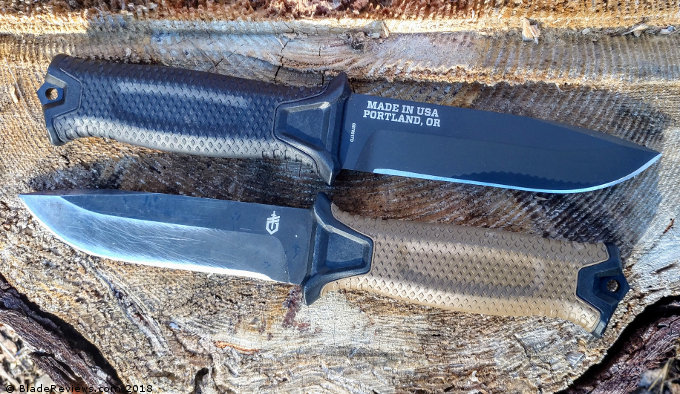
420 HC steel is a cheaper steel, and this is a knife on the affordable side. The downsides to 420 HC is that it won’t hold an edge for long. It’s one of those steels you sharpen before any really heavy duty cutting is needed. For a survival knife you don’t necessarily need a razor sharp edge for day to day work. It stays sharp enough for cutting paracord, stripping wires, and slicing through clothing for some time.
When it comes time to cut through thick materials you may need to run the blade over or through a sharpener a time or two before you go wild. 420 HC steel can actually get impressively sharp if you know your way around a sharpening stone. I’ve never failed to be impressed at how sharp my Dad makes his old Buck knife before skinning a deer and its made from the same 420 HC steel.
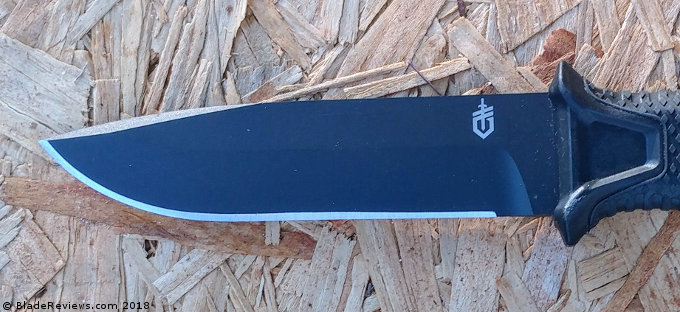
The StrongArm has a squared off spine that’s perfect for stripping bark, batoning wood, striking a ferro rod, and truncating wood. All tasks the Gerber StrongArm can commit to with real force. The StrongArm’s small handguard doesn’t really allow for a thumb on the blade grip so the less comfortable square spine isn’t an issue.
Handle and Ergonomics
The handle on the StrongArm is an interesting design. I do find it slightly smaller than necessary, but to be fair I have XL sized hands. Even with my large hands I still find the grip comfortable. The smaller grip isn’t much of an issue due to its design.
The Gerber StrongArm is glass filled nylon that’s covered with a rubber overmold. This makes the grip ‘soft’ in the hand. Squeezing it tight doesn’t result in much fatigue or pain. The little bit of give the rubber overmold offers results in a lot of comfort. The little bit of give also allows the blade to mold to your hand just a bit.
The rubber overmolded material is coated with a raised diamond textured pattern. This glues the knife to your hand and is perfect for cold, wet, or gloved hands. The pattern is rough, but doesn’t rub the hand raw, or even really create hotspots that I’ve noticed.
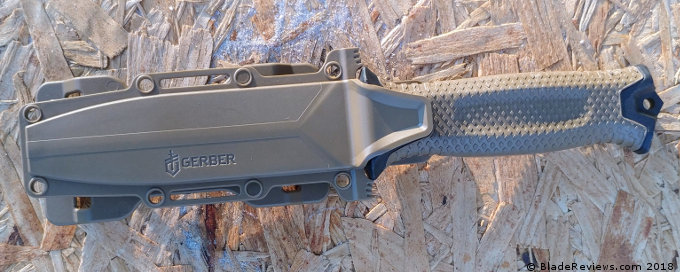
The bottom of the handle is a small pommel. It’s a lot smaller than the LMF II, but still capable enough to smash windows and skulls. It’s also got a lanyard loop if your StrongArm needs a leash.
Sheath
We’ll finish this up talking about the brilliant sheath system Gerber included with the StrongArm. It’s designed to be adaptable to the user. Popular knives typically have plenty of sheath options, but with Gerber you are getting all of them with the knife.
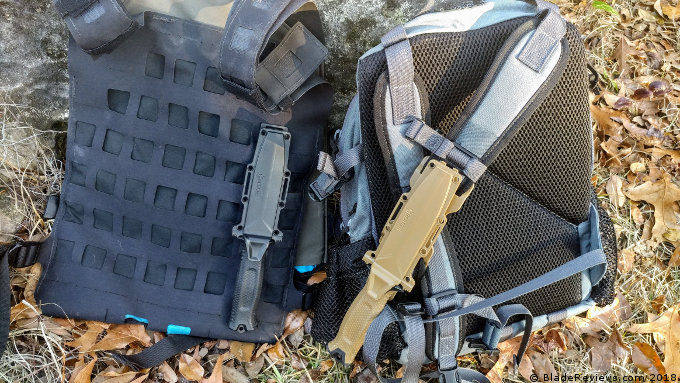
This includes a MOLLE mount, a drop leg system, and a belt loop option for horizontal carry. The knife is too big for any kind of horizontal concealed carry, but it’s really great for a snag free carry while wearing armor. When you draw from a standard belt carry sheath while wearing armor you are likely to get snagged on your gear in one way of the other. Drawing horizontally from the belt prevents this.
I also like the horizontal belt mount for mounting the knife vertically on my pack straps. This means my knife never leaves the pack I go camping with.
The Sheath employs both passive and active retention depending on the mount being used. The active retention is a simple snap button thong. The passive retention comes from an indent in the center of the handle. The sheath locks into this indent and holds the knife well.
In all my adventuring near and far it hasn’t fallen out when I’m using only passive retention. The sheath is also outfitted with plenty of lashing holes for those who aren’t satisfied with the included sheath options.
Gerber StrongArm Review – Final Thoughts
The Gerber StrongArm is a great little knife, especially when you factor in a street price of around 50 bucks. Gerber’s reputation was hit hard by imports of poorly made foreign knives, but they seem to be working hard to fix that reputation. The StrongArm is proudly stamped made in Portland, Oregon. The StrongArm is one of many made in USA knives in their catalog and likely one that will be around for a long time It’s an excellent budget bushcraft knife.
The StrongArm may not be the LMF II Infantry, but it’s a great knife, and a worthy successor to the LMF II.
- Iconic Strongarm Design: This Gerber Gear fixed blade knife features a full-tang, 420HC Steel with a plain edge that’s renowned for its corrosion resistance, edge retention, and strength
- Dependable Cutting Knife: Our camping knife boasts a rubberized diamond-texture grip for secure handling
- Versatile Knife Sheath: The StrongArm knife includes a MOLLE-compatible sheath for adaptable carry options, ensuring the hunting knife is accessible
- Tactical Edge: This fixed-blade knife also features a striking pommel, ideal for survival tasks in the toughest environments
Editor: I recommend purchasing the Gerber StrongArm at Amazon or BladeHQ. Please consider that buying anything through any of the links on this website helps support BladeReviews.com, and keeps the site going. As always, any and all support is greatly appreciated. Thank you very much.
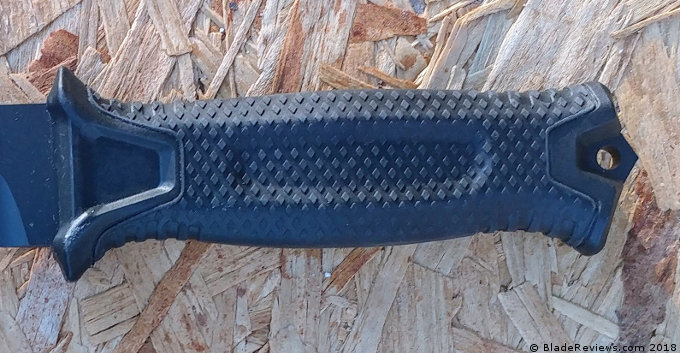
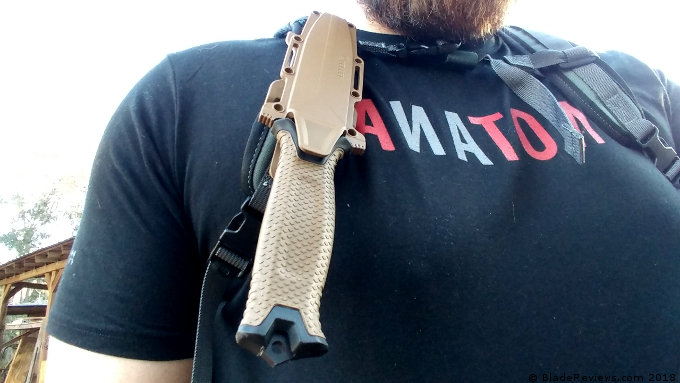

Excellent review of the Gerber StrongArm fixed blade knife and sheath.
Thanks!
Thanks, Michael!
Dan
Over the last couple years I’ve been drawn back to Gerber USA made. outstanding quality.
Thank you very much for a great recommendation about how to mount the sheath on the backpack strap using the original feature of the sheath! I was struggling with finding a suitable alternative way of how to do this, tried many kinds of mounting possibilities (using velcros straps, paracord, clips, …) but I couldn’t find a way how to deploy the default mounting option until I saw your picture showing that. Thanks for the aha moment!
“I’ve never failed to be impressed at how sharp my Dad makes his old Buck knife before skinning a deer and its made from the same 420 HC steel.”
This is not entirely correct. Buck uses 420HC steel, but subjects it to a proprietary heat treatment, developed by Paul Bos, that leads to a substantial increase in strength.
Do you have any instructions as to how you fastened the sheath vertically to your backpack straps? Thanks!